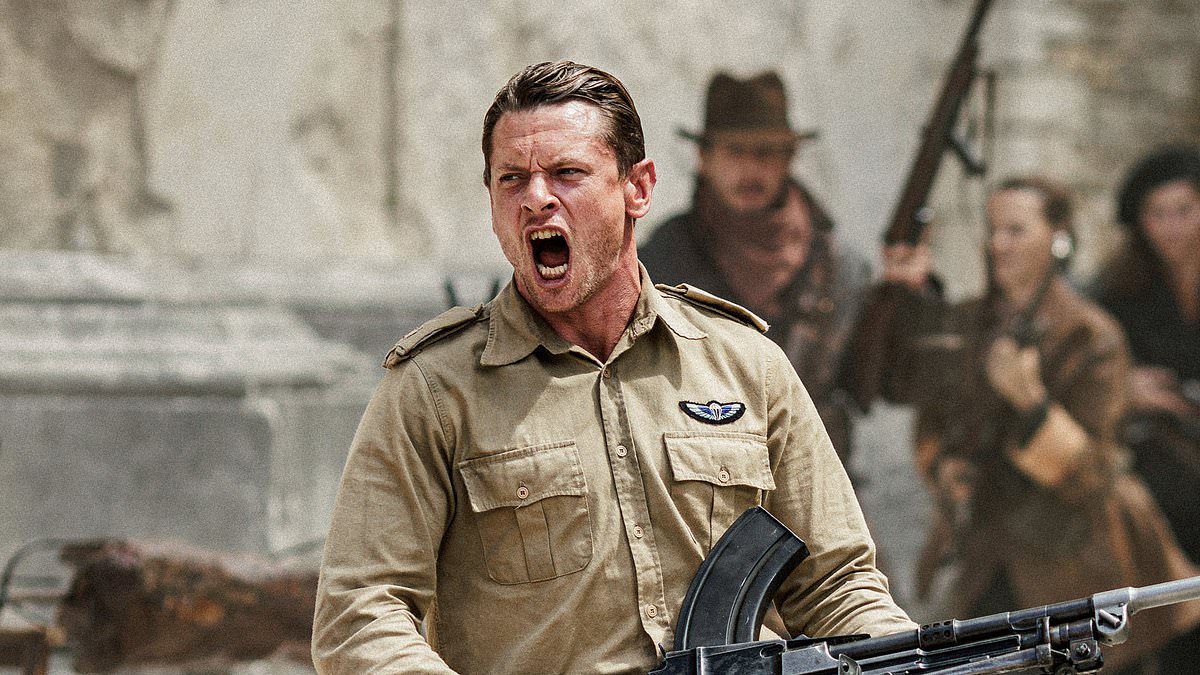The depiction of one of Britain’s greatest soldiers as a ‘lawless neo-gangster’ in BBC drama SAS Rogue Heroes is a ‘travesty’, a respected historian has said.
Lieutenant Colonel Blair ‘Paddy’ Mayne is portrayed by Jack O’Connell as an often drunk and ill-disciplined rebel in the show, which is currently airing for a second series after debuting in 2022.
It details the exploits of the men of the elite Special Air Service during the bloody invasions of Sicily and Italy in 1943.
Mayne – the unit’s commander – is seen desecrating a church, having repeated brawls and swearing profusely.
Damien Lewis, who has written more than a dozen books on the history of the SAS, slammed the portrayal.
He told : ‘The depiction of Mayne in SAS Rogue Heroes as a drunken, ill-disciplined, irreverent, uncouth, misfit who would never have fitted in to normal civilian life is plain wrong and a travesty.’
The historian added that the suggestion that Mayne and his men were ‘vagabonds and lawless neo-gangsters’ is ‘simply unacceptable’.
The real Mayne, who was killed in a road accident in 1955 aged 40, had been an international rugby player before the war, was a keen writer and lover of poetry and hated swearing.
He was awarded the Distinguished Service Order four times during the Second World War for his stunning acts of bravery, but was controversially denied the Victoria Cross.
A mystery Whitehall bureaucrat downgraded a recommendation that he receive the medal, which is Britain’s highest military honour.
He was recommended for it after saving the lives of comrades who were pinned down in a Nazi ambush in Germany in 1945.
SAS Rogue Heroes is based on a book of the same name by historian Ben Macintyre, which was written with the aid of the SAS’s own archive and testimony from founding members of regiment.
The on-screen adaptation was written and created by Steven Knight, the man behind hit show Peaky Blinders.
The second series of the show is set when Mayne has taken charge of the SAS after the capture and imprisonment of the unit’s founder, David Stirling.
Whilst O’Connell’s depiction of Mayne is proving controversial, he is still portrayed as being immensely brave and attracting the respect of the equally brave men serving under him.
The drama depicts how Mayne and his men were working amidst the threat of being executed should they have been captured.
Nazi dictator Adolf Hitler issued his infamous ‘Commando Order’ in 1942, after several successful raids by the SAS.
It mandated the summary execution of any captured commandos.
The opening of each Rogue Heroes episode warns viewers that whilst the show is ‘inspired by true events’ it should not be understood as a ‘history lesson’.
But critics have still taken aim at the show.
Gavin Mortimer, another historian of the SAS, said on social media platform X this week: ‘Rogue Heroes is frivolous entertainment & shouldn’t be taken seriously.
‘But the distortion of Blair “Paddy” Mayne is immoral & not surprisingly has upset his family’.
Mayne’s niece, Fiona Ferguson, told The Mail On Sunday last week that the portrayal of her uncle as a ‘drunken Irishman’ was ‘disrespectful’.
She added: ‘When you talk, as I have done, to the “originals” (the first members of the SAS who fought in North Africa) everybody respected him, followed him and doted on him.’
Mayne is also seen in the show desecrating a church by hanging his machine gun on a statue of Christ and being insubordinate during a meeting with Britain’s Army chief Bernard Montgomery.
Mr Lewis was also keen to highlight the mental trauma suffered by Mayne and his men as a result of what they saw and did in the heat of war.
Many of them displayed symptoms of post-traumatic stress disorder (PTSD), which has been documented for decades but was poorly understood in the 1940s.
‘In truth, it was the cumulative trauma of all that he suffered at the coal face of operations deep behind enemy limes over five years at war, including losing so many friends in such hellish ways, and having to kill and kill again the enemy, that meant that Paddy Mayne, as with so many of his stalwart comrades, emerged a scarred and troubled man,’ he said.
‘Today, we would recognise in our foremost war heroes the symptoms of chronic PTSD.
‘We would diagnose, acknowledge, accept and treat it, as our modern-day veterans deserve.
‘There was none of that back then for Mayne and his brethren and no respite and no recourse. It was shameful and an embarrassment.
‘The only recourse was drink and the company of ones fellow warriors – those who understood.
‘The true tragedy of Mayne and so many of his men is that these heroes were abandoned to their trauma at war’s end and so many – like Mayne – went to an early grave.
‘To suggest somehow that they were innately like this – born misfits and vagabonds and lawless neo-gangsters – is simply unacceptable.
‘And the greatest shortcoming is that the true characters, the true narrative and true stories are so much more powerful and compelling.’
A BBC insider has said the show does convey Mayne’s immense bravery.
The Northern Irishman was put forward for the VC after blasting through an ambush in April 1945 near Lorup in Lower Saxony.
Field Marshal Montgomery, who signed off the nomination, wrote of his ‘brilliant military leadership and cool calculating courage’, as well as a ‘single act of bravery’.
But the nomination was later downgraded in Whitehall. A letter said Mayne’s bravery was not a ‘single act of heroism’ because he had another soldier with him.
Mr Lewis is among those who have called for him to be posthumously awarded the VC.
He said a precedent was set in November when an n soldier posthumously received a VC.
Private Richard Norden was honoured decades for rescuing a wounded soldier amid enemy fire in Vietnam in 1968.
